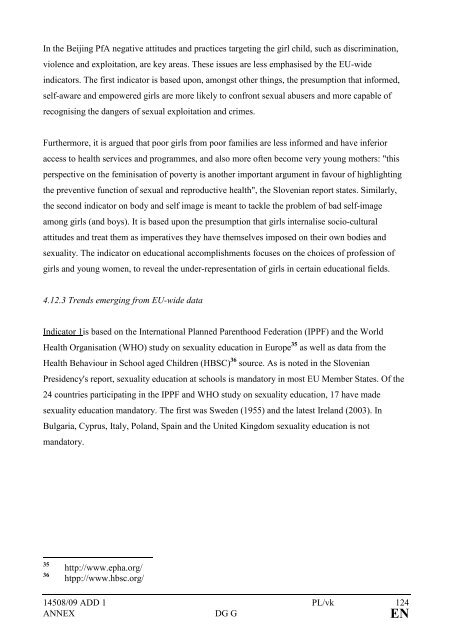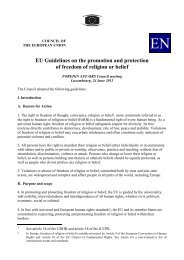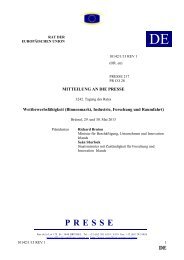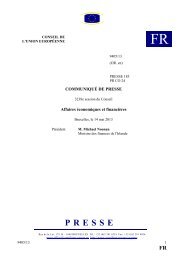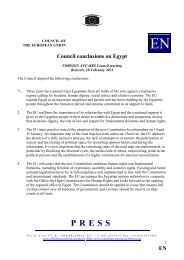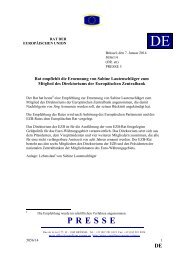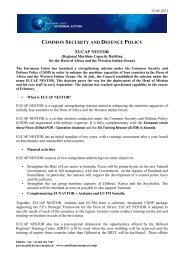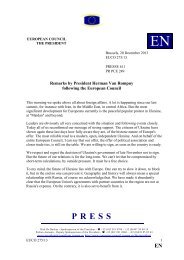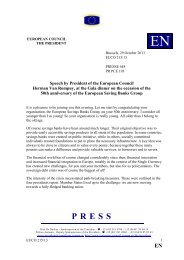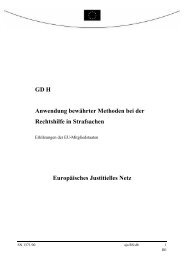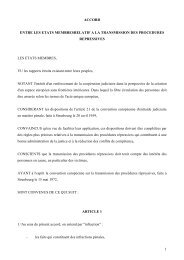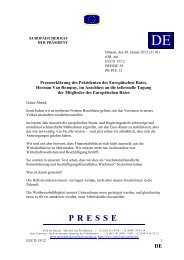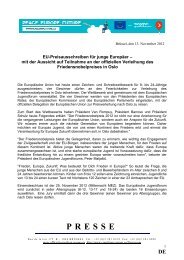14508/09 ADD 1 PL/vk 1 DG G COUNCIL OF THE ... - Europa
14508/09 ADD 1 PL/vk 1 DG G COUNCIL OF THE ... - Europa
14508/09 ADD 1 PL/vk 1 DG G COUNCIL OF THE ... - Europa
Create successful ePaper yourself
Turn your PDF publications into a flip-book with our unique Google optimized e-Paper software.
In the Beijing PfA negative attitudes and practices targeting the girl child, such as discrimination,<br />
violence and exploitation, are key areas. These issues are less emphasised by the EU-wide<br />
indicators. The first indicator is based upon, amongst other things, the presumption that informed,<br />
self-aware and empowered girls are more likely to confront sexual abusers and more capable of<br />
recognising the dangers of sexual exploitation and crimes.<br />
Furthermore, it is argued that poor girls from poor families are less informed and have inferior<br />
access to health services and programmes, and also more often become very young mothers: "this<br />
perspective on the feminisation of poverty is another important argument in favour of highlighting<br />
the preventive function of sexual and reproductive health", the Slovenian report states. Similarly,<br />
the second indicator on body and self image is meant to tackle the problem of bad self-image<br />
among girls (and boys). It is based upon the presumption that girls internalise socio-cultural<br />
attitudes and treat them as imperatives they have themselves imposed on their own bodies and<br />
sexuality. The indicator on educational accomplishments focuses on the choices of profession of<br />
girls and young women, to reveal the under-representation of girls in certain educational fields.<br />
4.12.3 Trends emerging from EU-wide data<br />
Indicator 1is based on the International Planned Parenthood Federation (IPPF) and the World<br />
Health Organisation (WHO) study on sexuality education in Europe 35 as well as data from the<br />
Health Behaviour in School aged Children (HBSC) 36 source. As is noted in the Slovenian<br />
Presidency's report, sexuality education at schools is mandatory in most EU Member States. Of the<br />
24 countries participating in the IPPF and WHO study on sexuality education, 17 have made<br />
sexuality education mandatory. The first was Sweden (1955) and the latest Ireland (2003). In<br />
Bulgaria, Cyprus, Italy, Poland, Spain and the United Kingdom sexuality education is not<br />
mandatory.<br />
35 http://www.epha.org/<br />
36 htpp://www.hbsc.org/<br />
<strong>14508</strong>/<strong>09</strong> <strong>ADD</strong> 1 <strong>PL</strong>/<strong>vk</strong> 124<br />
ANNEX <strong>DG</strong> G EN


